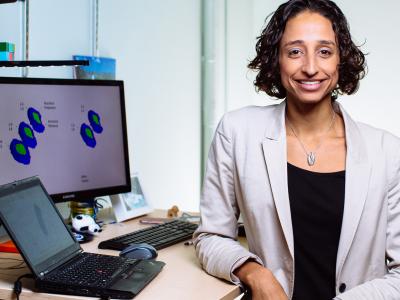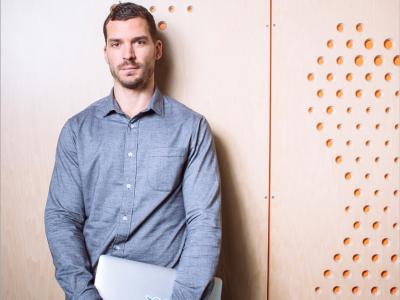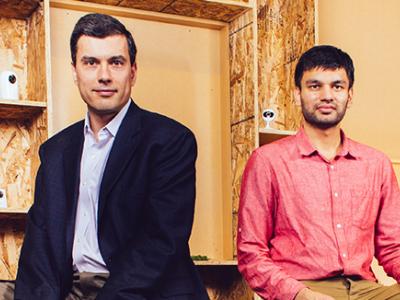About

About
The Signatures Innovation Fellows Program supported innovative research by UC Berkeley researchers in the data science and technology areas with a special focus on projects that hold commercial promise. The Program was committed to the development of entrepreneurs, whether they be faculty, or postdoctoral fellows and graduate student entrepreneurs who work in collaboration with faculty on a journey to building great companies.
The Program supported four successful cohorts between 2015/16 - 2018/19 and is no longer accepting new applications.
Signatures Innovation Fellows each received support of up to $75,000/year for a maximum of two years. The funds were available to be used for a range of activities, including
- postdoctoral salary and graduate student fellowship support for entrepreneurial activities,
- to assist with early stage development,
- to obtain entrepreneurship training,
- understanding market opportunities for technological developments,
- developing intellectual property avenues,
- considering the incorporation of a start-up company,
- networking with mentors and potential partners,
- engagement with external partners and funders, or
- other discretionary activities that enable entrepreneurial pathways.
The Fellows became part of and contributed to an ecosystem that brings together postdoctoral fellows, students, faculty, staff and alumni to form a strong network that assists researchers in introducing their discoveries to the market. Please write to datascience@berkeley.edu with any questions you may have about the program.
Advisory Committee
The Advisory Committee of the Signatures Innovation Fellows Program is comprised of a small group of eminent leaders in the data science and software areas — both in the academic setting and in industry.
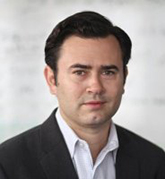 Josh Bloom, UC Berkeley
Josh Bloom, UC Berkeley
Josh Bloom is an astronomy professor at the University of California, Berkeley where has taught high-energy astrophysics and Python for data scientists. He has published over 300 refereed articles largely on time-domain transients events and telescope/insight automation. His book on gamma-ray bursts, a technical introduction for physical scientists, was published recently by Princeton University Press. He is also co-founder and CTO of Wise.io, a startup based in Berkeley building machine learning applications for customer success. Josh has been awarded the Data-Driven Discovery prize from the Moore Foundation and the Pierce Prize from the American Astronomical Society; he is also a former Sloan Fellow, Junior Fellow at the Harvard Society, and Hertz Foundation Fellow. He holds a PhD from Caltech and degrees from Harvard and Cambridge University. Additional background on Josh Bloom.
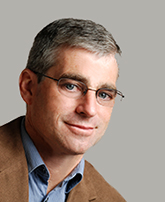 David Culler, UC Berkeley
David Culler, UC Berkeley
David Culler is a Professor in the Department of Electrical Engineering and Computer Sciences (EECS) at UC Berkeley. His research addresses networks of small, embedded wireless devices, planetary-scale internet services, parallel computer architecture, parallel programming languages, and high performance communication. It includes TinyOS, Berkeley Motes, PlanetLab, Networks of Workstations (NOW), Internet services, Active Messages, Split-C, and the Threaded Abstract Machine (TAM). David is also the founder of Arch Rock, a company that makes wireless networked sensors. He is a member of the National Academy of Engineering and a Fellow of ACM and IEEE. His work on networks of wireless sensors earned him a place on Scientific American’s annual list of top 50 innovators and Technology Review’s “10 Emerging Technologies That Will Change the World.” In 2013, he received the Okawa Prize. Additional background on David Culler.
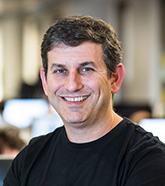 Joe Hellerstein, UC Berkeley
Joe Hellerstein, UC Berkeley
Joseph M. Hellerstein is a Chancellor's Professor of Computer Science at the University of California, Berkeley, whose work focuses on data-centric systems and the way they drive computing. He is an ACM Fellow, an Alfred P. Sloan Research Fellow and the recipient of three ACM-SIGMOD "Test of Time" awards for his research. In 2010, Fortune Magazine included him in their list of 50 smartest people in technology , and MIT's Technology Review magazine included his work on their TR10 list of the 10 technologies "most likely to change our world".
He is the co-founder and Chief Strategy Officer of Trifacta, a software vendor providing intelligent interactive solutions to the messy problem of wrangling data. He serves on the technical advisory boards of a number of computing and Internet companies including EMC, SurveyMonkey, Captricity, and Dato, and previously served as the Director of Intel Research, Berkeley. Additional background on Joe Hellerstein.
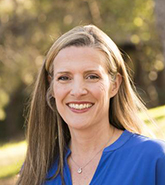 Rebecca Lynn, Canvas Ventures
Rebecca Lynn, Canvas Ventures
Ranked #23 out of 100 top tech investors on Forbes’s 2015 Midas List Rebecca Lynn is a Partner at Canvas Ventures. She focuses on early-stage venture investments in financial services, digital health, SaaS, and mobile. Rebecca led Canvas’s investments in FutureAdvisor (acquired by Blackrock), CrowdFlower, HealthLoop, and Viewics, and currently sits on the boards of each.
In 2007, Rebecca joined Morgenthaler Ventures and continues to serve on the boards of that firm’s portfolio companies. She led an early-stage investment in Lending Club (NYSE: LC), which was the largest US technology IPO of 2014 and the fourth largest US Internet IPO since 2001 behind Facebook, Twitter, and Google. She also led investments in Check (acquired by Intuit), RelateIQ (acquired by Salesforce), Doximity, Practice Fusion, and Convo.
Rebecca is a member of the California Bar Association and a member of the US Patent Bar, with a focus on intellectual property litigation and corporate law. She was published in the Berkeley Law and Technology Journal. Rebecca is also an inventor on several issued patents. She has a chemical engineering degree from the University of Missouri and a JD/MBA from UC Berkeley. Additional background on Rebecca Lynn.
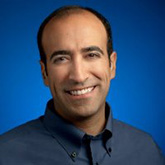 Babak Pahlavan, Google
Babak Pahlavan, Google
Babak Pahlavan is an entrepreneur, advisor, investor and hands-on product manager who currently oversees the product management teams for Google Analytics (GA), Google Tag Manager, Adometry and a few other Big-Data products at Google. As the Director of product management he leads the product teams for all of Web & Apps Analytics, GA’s audience products, attribution products (GA multi-channel funnels, search funnels & adometry), A/B testing, integration with Adwords, DoubleClick, AdMob, Play Store, etc. He was also the architect behind the acquisition of Adometry, which Google announced in May 2014.
He is a winner of the 2014 Top Google Manager Award, which was an honor, bestowed on 22 out of 6,000+ managers at Google that year. Other recent awards include recognition on Forbes' "30 under 30 in technology” list in 2012. Earlier in his career, Babak founded and led Clever Sense (AI-based big-data location-based recommendation platform) from inception until acquisition by Google in December 2011.
Babak received an M.S. in Electrical Engineering with emphasis on business & CS from Stanford University, and a B.S. in Electrical Engineering and Computer Sciences (EECS) from UC Berkeley. Additional background on Babak Pahlavan.
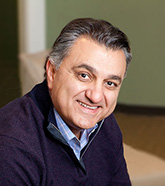 Bobby Yazdani, Signatures Capital
Bobby Yazdani, Signatures Capital
Drawing on nearly three decades of entrepreneurial experience in Silicon Valley, Bobby Yazdani mentors, advances and empowers entrepreneurs in their journey to build great companies. He works full-time on the development and support of entrepreneurs through his venture capital firm Signatures Capital. In 2014, Bobby was ranked #1 out of 2000 angel investors in a report by CB Insights as having the most successful track record for investing in companies that received follow-on funding. Bobby made his first angel investment in 1989 in medical technology company Masimo (NASDAQ: MASI), where, in addition to providing capital, he wrote software to enhance the accuracy of the company’s early neonatal pulse oximeters. In addition, he has successfully mentored entrepreneurs and invested in over 100 early-stage startups.
In 1997 Bobby founded Saba, taking the company public in 2000. Today, Saba is the leading provider of Human Capital Development & Management Solutions. Its applications are being used by over 30 million people from 2200 customers across 195 countries and in 37 languages worldwide. While at Saba, he was named a finalist for Ernst & Young Entrepreneur of the Year Award. Saba also earned spots on InformationWeek’s Innovation 100 list and Computerworld’s 100 Emerging Companies to Watch. Prior to Saba, Bobby worked at Oracle in various R&D roles from 1988 to 1997.
Born in Tehran, Iran, Bobby completed high school in England and received a B.A. in Applied Mathematics at the University of California, Berkeley. His generous support established the Signatures Innovation Fellows program at UC Berkeley in 2015.
2018-19 Fellow
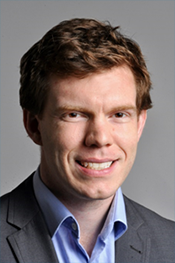 Hayden Taylor
Hayden Taylor
Mechanical Engineering
Project: Advanced Algorithms for Computed Axial Lithography: Enabling True Volume-at-Once Additive Manufacturing
We have invented (with Livermore Lab), and are developing towards commercialization, a new approach to additive manufacturing: Computed Axial Lithography (CAL). Existing additive processes have serious speed and mechanical strength limitations that arise from the fact that they print laboriously, layer-by-layer. CAL, on the other hand, creates the entire volume of a design at once by rotating dynamically-evolving projected light pattern relative to a volume of photosensitive material. A 3D object emerges as hundreds of projections from different angles sum together to impart a customized illumination dose to the material.
As well as offering at least an order of magnitude faster printing, CAL eliminates the need for dedicated supporting structures, can print much smoother surfaces, and can work with a wider range of starting materials including very viscous resins as well as extremely soft, flexible and fragile materials. A further unique advantage is that of ‘overprinting’, which allows 3D designs to be fabricated around pre-existing solid objects made from other materials. We foresee CAL changing the way designs are prototyped but also driving additive manufacturing into scores of new applications.
Hayden Taylor is an assistant professor of Mechanical Engineering at Berkeley. His research group invents, models and simulates manufacturing processes, particularly those where process physics and geometrical design complexity interact strongly to determine manufacturing performance. CAL is one example of such a process; another particular focus has been on nanoscale manufacturing, including nanoimprint lithography, 2D materials exfoliation, and semiconductor wafer polishing and etching process flows. He holds a Ph.D. in EECS from MIT and a B.A. and M.Eng. from Cambridge University.
2017-18 Fellows
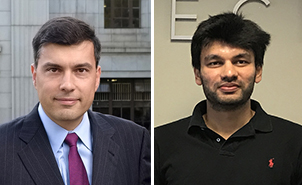 Alex Bayen and Pulkit Agrawal
Alex Bayen and Pulkit Agrawal
Electrical Engineering and Computer Sciences & Civil and Environmental Engineering
Project: “Real-time Video Monitoring of Falls in Memory-Care Facilities for Individuals with Alzheimer's and Related Dementias”
The main goal of the project is to deploy an online system composed of off-the-shelf wall-mounted cameras to passively detect safety-critical events for individuals with Alzheimer’s disease and related dementias enabled by a human in the loop to assist large networks of memory care facilities. Specifically, the system will provide the following automated detection of safety-critical events: 1) Identification of when the patient has fallen down, and 2) Identification of when a patient has risen from bed.
It does not require action of individuals or their caregivers such as wearing a fall pendant and is therefore well-suited for individuals with ADRD. We develop a deep learning approach to identify and pre-filter falls not perfectly, but well enough to leave the last check to a human, who will call the facilities in case of detected safety critical event. The human can monitor several facilities at a given time.
Alex Bayen is the Liao-Cho Professor of Engineering at UC Berkeley, in the Electrical Engineering and Computer Science department. His field of expertise is mobile sensing and optimization. Prior to becoming a faculty at UC Berkeley, he worked for the Department of Defense in France where he held the rank of Major. He has a B.S. from Ecole Polytechnique, and an M.S. and Ph.D. from Stanford University. He has advised over 20 Ph.D. students and 100 undergraduate / master students. He published 2 books and over 200 publications, and has received numerous awards, including the PECASE (White House), CAREER (NSF), Ruberti Prize (IEEE) and Huber Prize (ASCE).
Pulkit Agrawal is a Ph.D. Student in the department of Computer Science at UC Berkeley and his research focuses on computer vision, robotics and computational neuroscience. Pulkit completed his bachelors in Electrical Engineering from IIT Kanpur and was awarded the Director’s Gold Medal. He is a recipient of Fulbright Science and Technology Award, Goldman Sachs Global Leadership Award, OPJEMS, Sridhar Memorial Prize and IIT Kanpur’s Academic Excellence Awards among others. His research papers have been published in top AI conferences and have received best paper awards.
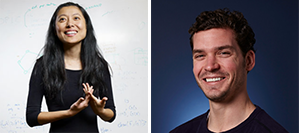 Dawn Song and Noah Johnson
Dawn Song and Noah Johnson
Electrical Engineering and Computer Sciences
Project: "Allegro: Secure and Privacy-preserving Data Analytics”
As the growth in large-scale data collection continues, much of this valuable data remains siloed due to privacy concerns. This results in underutilization of the data, hindering advancements in many fields. The work of Dawn Song and Noah Johnson aims to address this important issue by creating a privacy-preserving data analytics and machine learning platform that enforces fine-grained security and privacy policies on sensitive data while enabling rich data analytics and machine learning. Their system is built on a novel program analysis and rewriting framework. The analysis engine determines the security and privacy impact of a program prior to its execution, and the rewriting engine automatically modifies the program to ensure compliance with the specified security policies. Their approach is practical and easy to deploy: it is transparent to data analysts without requiring any changes to their workflow, and works with all standard databases without requiring any changes to the database. The system will encourage data analytics and machine learning across a broad range of domains—including healthcare, finance, and government—while providing strong formal guarantees of privacy.
Dawn Song is a Professor in the Department of Electrical Engineering and Computer Science at UC Berkeley. She has done extensive research at the intersection of machine learning and security. She is the recipient of various awards including the MacArthur Fellowship, the Guggenheim Fellowship, the NSF CAREER Award, the Alfred P. Sloan Research Fellowship, the MIT Technology Review TR-35 Award, and Best Paper Awards at top conferences.
Noah Johnson is a fifth year Ph.D. candidate with significant experience in both industry and academic research. Noah’s research contributions have spanned several areas including binary analysis, vulnerability diagnosis, mobile security, and security and privacy for big data. He has presented his work at top-tier academic security conferences as well as Black Hat, a premiere venue for industry security practitioners.
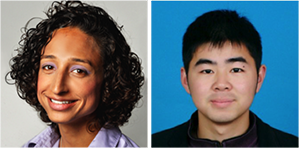 Grace O’Connell and Bo Yang
Grace O’Connell and Bo Yang
Mechanical Engineering
Project: "Innovating Diagnostics and Treatment Planning for Lower Back Pain"
Professor O'Connell and her team are developing patient-specific computer models from medical images to guide surgery. By evaluating stresses place on the spine with deconstruction and realignment, they hope to allow surgeons to optimize their surgical strategies by decreasing stresses place on the spine after surgery. To do this they are working with surgeons at UC Davis Medical Center.
Grace O'Connell is an Assistant Professor in the Department of Mechanical Engineering and is a co-director of the Berkeley Biomechanics Laboratory. O'Connell's research focuses on soft tissue biomechanics, including the intervertebral disc and articular cartilage. Her research combines computational and experimental approaches to understanding the effect of injury and degeneration on tissue mechanics.
Grace is partnering with Bo Yang, a fourth year Ph.D. student in the Department of Mechanical Engineering. Yang's research is focused on developing subject-specific computational models to study disc joint mechanics.
2016-17 Fellows
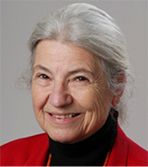 Ruzena Bajcsy
Ruzena Bajcsy
Electrical Engineering and Computer Sciences
Project:
Individualized Human Modeling for Medical Diagnosis and Prescription of Assistive Devices
Genetic diversity, lifestyle changes, illness, injury, age and medical intervention all affect a person’s movement, strength, and ability. Existing clinical methods are highly inefficient, requiring patients to performing a number of time consuming actions. The results of these tests are qualitative, and may not relate to the functional abilities of the individual such as self-feeding. This project aims to change the way medical diagnosis is performed by generating automated models of a persons’ abilities using affordable sensors. The results in representative models of an individual’s limbs, joints, range of motion, masses and strengths. These measurements can be tracked over time to determine recovery after injury. These measurements can also be correlated with treatments allowing the best medical intervention for a new patient to be predicted. These tools have been used in the upper limbs to quantify the severity in patients with muscular dystrophy, and the generation of assistive devices (exoskeletons).
Ruzena Bajcsy is a Professor of Electrical Engineering at UC Berkeley. Working with Robert Matthew, their research focuses on developing affordable methods for modeling a person and their abilities. This research has led to the development of individualized human models, with translation to assistive robotic devices such as exoskeletons. Their aims are to create a new framework for conducting individualized health monitoring outside of the hospital environment to reduce the risk of injury, and secondary complications and improve quality of life and recovery.
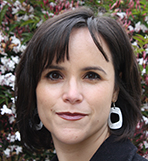 Lisa García Bedolla
Lisa García Bedolla
Graduate School of Education
Project:
DIODE: Data Innovation for Organizing a Diverse Electorate
The United States has the lowest participation rates of any advanced industrialized country. Over the past decade, community organizations interested in making U.S. politics more participatory have adopted an integrated voter engagement (IVE) model, an approach predicated on the idea that political engagement happens most effectively through long term relationship building during and between electoral cycles. Our campaign data infrastructure, however, is not designed to provide the data support and analytics necessary to make an IVE strategy effective, particularly for groups working to engage diverse groups of voters. Through the development of a new open source data system (called DIODE) for California voters, this project will address this need, allowing organizations to maximize their civic engagement efforts and grow those efforts more effectively over time.
Professor Lisa García Bedolla is Chancellor’s Professor in UC Berkeley’s Graduate School of Education. She studies why people choose to engage politically. She has used a variety of social science methods
– field observation, in-depth interviewing, survey research, field experiments, and geographic information system (GIS) – to shed light on this question. She has published four books and dozens of research articles exploring U.S. civic engagement patterns, earning five national book awards and numerous other awards. She has consulted for presidential campaigns and statewide ballot efforts and has partnered with over a dozen community organizations working to empower low-income communities of color. Through those partnerships, she has developed a set of best practices for engaging and mobilizing voters in these communities, becoming one of the nation’s foremost experts on political engagement within communities of color.
In partnership with the Social Apps Lab at CITRIS, she is working with a team of researchers that include Dr. Cristhian Parra, who obtained his Ph.D. in computer science from the University of Trento, Italy in 2009, and Rosenberg Foundation Leading Edge Fellow Michael Gómez Daly.
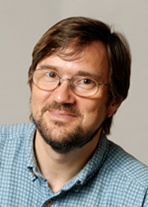 Vern Paxson
Vern Paxson
Electrical Engineering and Computer Sciences
Project:
VAST: High-Fidelity Network Forensics at Scale
While the past twenty years have introduced revolutionary changes in forensic techniques for criminal investigations - DNA sequencing, mass spectrometry, automated fingerprint identification - the task of analyzing cyber attacks has seen much less in the way of comparable advances. Our proposed technology, VAST (Visibility Across Space and Time), centers around developing such a capability: a platform for forensic analysis that captures and retains a high-fidelity archive of cyber-activity at the scale of an entire network, rather than a single host or network service.
Vern Paxson is a Professor of Electrical Engineering and Computer Sciences at UC Berkeley. He also leads the Networking and Security Group at the International Computer Science Institute in Berkeley, and has an appointment as a Staff Scientist at the Lawrence Berkeley National Laboratory. His research focuses heavily on measurement-based analysis of network activity and Internet attacks. He works extensively on high performance network monitoring, detection algorithms, cybercrime, and countering censorship, and co-directs the Center for Evidence-based Security Research (www.evidencebasedsecurity.org).
He will be working with a team of researchers that includes Matthias Vallentin, who will complete his Ph.D. at UC Berkeley in Spring 2016.
2015-16 Fellows
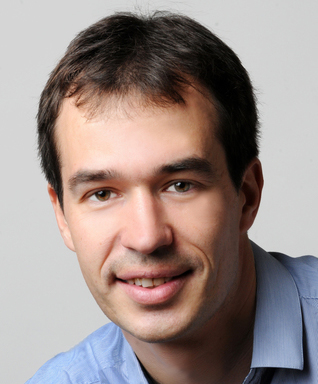 Alexei Pozdnoukhov
Alexei Pozdnoukhov
Civil and Environmental Engineering
Project: Urban Mobility Analytics
The current paradigm shift in urban mobility is changing the transportation landscape more quickly than traditional means of data collection can reflect. This project enables scalable processing and modeling of large volumes of heterogeneous unstructured mobility data physically distributed over different private and public entities, in a privacy-preserving manner. It builds key components that will allow transportation agencies and mobility service providers make informed planning and operations decisions, enabling a public-private mobility-as-a-service ecosystem.
Alexei Pozdnoukhov is a Professor of Civil and Environmental Engineering at UC Berkeley, working on complex data analysis in the domains of Civil Systems and Transportation. He holds a Ph.D. in computer science from EPFL, Switzerland. He has carried out research in machine learning methods and computer vision at IDIAP Research Institute in Martigny, Switzerland and worked on remote sensing and spatial data mining at the University of Lausanne (UNIL). Most recently, he held the position of Science Foundation Ireland Stokes Lecturer with the National Centre for Geocomputation (NCG). His research areas include machine learning, spatial data mining, computational social science, urban mobility, and smart cities.
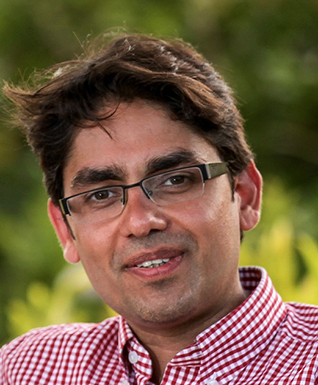 Jasjeet S. Sekhon
Jasjeet S. Sekhon
Political Science and Statistics
Project: Platform for Design, Implementation, and Analysis of Randomized Experiments
Marketing and advertising firms, both online and offline, have increasingly conducted randomized controlled experiments to evaluate, improve, and target their efforts. However, we have identified significant analytical shortcomings and unnecessary costs in current experimental designs. Using recent advances in blocking algorithms and statistical machine learning, we propose a web-based platform that will simplify and improve the design, implementation, and analysis of randomized experiments.
Jasjeet S. Sekhon is a Professor of Political Science and Statistics at UC Berkeley. His current research focuses on methods for causal inference in observational and experimental studies and evaluating social science, public health and medical interventions. Professor Sekhon has done research on elections, voting behavior and public opinion in the United States, multivariate matching methods for causal inference, machine learning algorithms for irregular optimization problems, robust estimators with bounded influence functions, health economic cost effectiveness analysis, and the philosophy and history of inference and statistics in the social sciences.
Frequently Asked Questions
- What is the Signatures Innovation Fellows Program?
The Signatures Innovation Fellows Program supports innovative entrepreneurial activities by UC Berkeley researchers in the data science and technology areas with a special focus on connecting research to projects that hold commercial promise. The Program is committed to the development of entrepreneurs, whether they be postdoctoral fellows or graduate student entrepreneurs who work in collaboration with faculty or faculty themselves, on a journey to building great companies. Our purpose is to support critical technology development, help develop skills, open pathways to market, and identify the most suitable business models, partners, and financing mechanisms
The Program was inaugurated in spring 2015, and awards are made on an annual basis with an application deadline during the spring term. We expect to make at least 3 awards each year.
In 2015/16, and 2016/17 awards were made to UC Berkeley faculty with a preference given to teams that included a graduate student or postdoctoral researcher. Since 2017/18 awards have been made to teams led by faculty, postdoctoral fellows and/or graduate students.
- What are the benefits of participating in the Signatures Innovation Fellows Program?
Postdoctoral fellows and graduate students selected as Signatures Innovation Fellows will each receive support of up to $75K/year for a maximum of two years. The funds may be used for
postdoctoral salary and graduate student fellowship support for entrepreneurial activities, to assist with early stage development,
Non-faculty Fellows are expected to work in partnership with a UC Berkeley faculty member. In addition, the program seeks to have each Fellow become part of and contribute to an ecosystem that brings together post-docs, students, faculty, staff and alumni to form a strong network that assists researchers in introducing their discoveries to the market. The program also seeks to build a relationship with the entrepreneurs it supports that allows them to “pay the good will forward” by participating in the university’s Founder’s Pledge Program.
- to obtain entrepreneurship training,
- understanding market opportunities for technological developments,
- developing intellectual property avenues,
- incorporation of a start-up company,
- networking with mentors and potential partners,
- engagement with external partners and funders, or
- other discretionary activities that enable entrepreneurial pathways.
- What are the expectations of the Signatures Innovation Fellows?
Signatures Innovation Fellows are expected to provide regular updates on their research-to-market progress, identifying important developments, milestones achieved, unanticipated challenges encountered. They are expected to actively engage with the campus network that facilitates the commercialization of research. The progress of each Signatures Fellow will be reviewed at the end of the first year by the Program’s Academic and Industry Advisory Committees to determine continuation of the second year.
It is understood that as part of the early entrepreneurial journey, Fellows may change the direction of their research-to-market efforts as necessitated by scientific discovery, access to funding, market conditions etc. Signatures Innovation Fellows Program Advisory Committees encourage early notification of such developments so they can better support the Fellow in navigating such changes.
- Who is eligible to apply?
The program seeks to support teams led by faculty, postdoctoral researchers and/or graduate students. Note that only postdoctoral fellows and/or graduate students who are already on the UC Berkeley campus at the time of application are eligible to apply. Successful applicants will be working in close collaboration with a UC Berkeley faculty member. A formal letter of support from the faculty member is required for the application. If you are a faculty member, please submit a letter of interest from the postdoctoral fellow and/or graduate student with whom you expect to work on this project.
- When is the application deadline?
This program is no longer accepting applications.
- How do faculty, post-docs and graduate students apply for the Signatures Innovation Fellows Program?
To apply, please complete the Signatures Innovation Fellows Program application.
- How are the Signatures Innovation Fellows selected?
Awards are made on the basis of both the commercial potential and scientific and/or technical merit of the proposed project. The Program especially seeks to support teams that include a faculty member as well as a postdoctoral researcher and/or graduate student.
More specific selection criteria include the following:
The research-to-market opportunity must be novel and compelling in a reasonable timeframe, ideally bringing practical benefit to society. The goal of the Signatures Innovation Fellows Program is to catalyze the commercialization of innovative research results. Indicators of desirable outcomes of this program may include the filing of a patent application, licensing of intellectual property rights, new industry partnerships and/or the creation of a new company. Please describe how your proposed project could potentially lead to one or more of these indicators and how they relate to the desired outcome of bringing innovative research into the market to benefit some segment.
The selection process involves two committees: (a) a three-member Academic Advisory Committee, and (b) a three-member Industry Advisory Committee. The Academic Advisory Committee will screen the initial applicants and the final candidates will be selected jointly by the two committees.
- Applicants should provide specific milestones, including identification of potential points of risk and when they need to be overcome. These will allow the Advisory Committees to better support the fellow and to assess at the year whether the program support is effective.
- Proposals should demonstrate the benefit that the research and market transition will gain from support through the Signatures Innovation Fellows Program. Additional existing and pending sources of funding, matching grants and gifts-in-kind should be included.
- When does support start?
Successful applicants to the third cohort of the Signatures Innovation Fellows Program were selected in spring 2018 with support starting July 1, 2018.
- Who are the members of the Signatures Innovation Fellows Academic Advisory Committee?
- Joshua Bloom, Professor, Astronomy, UC Berkeley
- David Culler, Professor, Electrical Engineering and Computer Sciences, UC Berkeley
- Joe Hellerstein, Professor,Electrical Engineering and Computer Sciences, UC Berkeley
- Who are the members of the Signatures Innovation Fellows Industry Advisory Committee?
- Rebecca Lynn, Canvas Capital
- Babak Pahlavan, Google
- Bobby Yazdani, Signatures Capital

